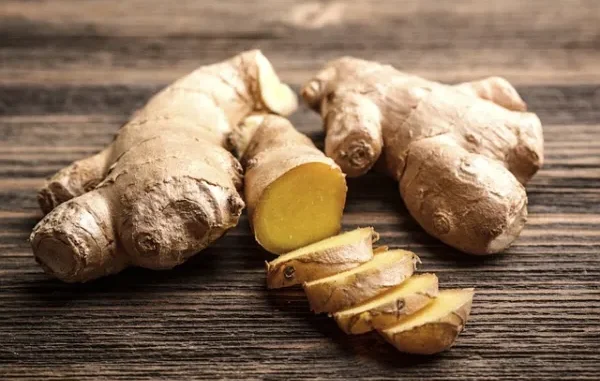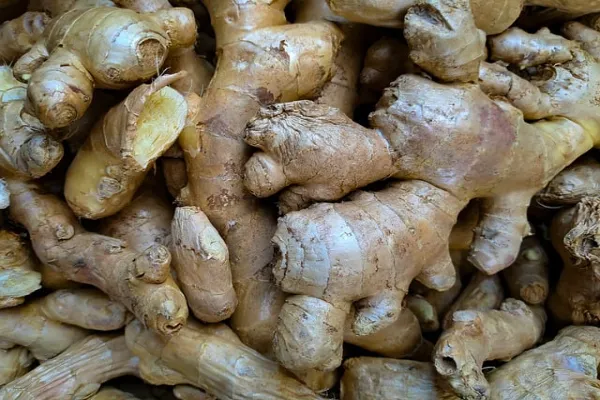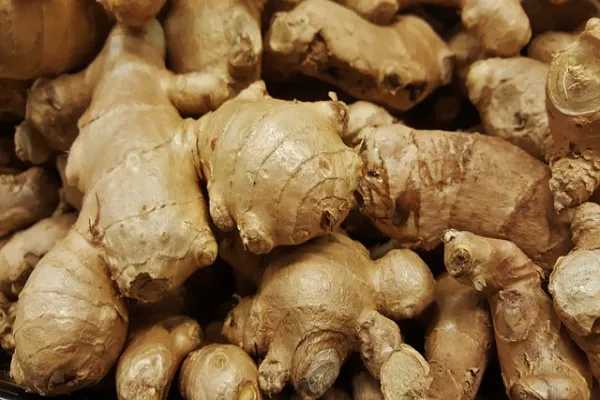
Ginger is a versatile spice that has been prized for its medicinal properties and unique flavor for thousands of years. This root has been used in various forms, including fresh, powdered, and as an essential oil, to flavor dishes, beverages, and even beauty products. In addition to its culinary uses, ginger has a rich history and a number of intriguing facts. In this article, we will delve into some of the most interesting facts about ginger that highlight its significance and versatility.
Here are 10 Interesting Facts About Ginger:
- Ginger isn’t actually a root, it’s a rhizome! A rhizome is a modified stem that grows underground and stores nutrients for the plant.
- Ginger originated in Southeast Asia, most likely around India and China.
- It has been used for centuries as a spice and medicinal herb. In fact, there’s evidence of ginger use in China dating back to 4,000 years ago!
- The “ginger snap” flavor in gingerbread cookies doesn’t actually come from ginger, but rather from a combination of cinnamon, cloves, and nutmeg.
- Gingerol is the main bioactive compound in ginger, and it’s what gives ginger its characteristic spicy flavor.
- Ginger has numerous potential health benefits, including reducing nausea, relieving inflammation, and lowering blood sugar levels.
- There are many ways to enjoy ginger. You can add it to stir-fries, curries, smoothies, or even tea. Candied ginger is a popular candy, and ginger is also used in some alcoholic beverages like ginger beer.
- Ginger is a relatively easy plant to grow at home. You can plant a piece of ginger rhizome in a pot with some soil, and keep it watered. It will eventually sprout green shoots and can be harvested for fresh ginger.
- Ginger has a long history of use in religious and cultural ceremonies around the world. In some cultures, ginger is believed to have aphrodisiac properties.
- The name “ginger” comes from the Sanskrit word “shringavera,” which means “horn-shaped.” This is likely due to the shape of the ginger rhizome.
The Surprising Health Benefits of Ginger
Ginger, a popular spice known for its distinct flavor and aroma, has long been used in traditional medicine for its various health benefits. In recent years, scientific research has supported many of these claims, revealing the surprising health benefits of ginger.
One of the most well-known benefits of ginger is its ability to alleviate nausea and digestive issues. Studies have shown that ginger can help reduce nausea and vomiting in pregnant women, chemotherapy patients, and individuals undergoing surgery. Ginger is also believed to help improve digestion by stimulating the production of digestive enzymes and speeding up the emptying of the stomach.
In addition to its digestive benefits, ginger has also been found to have anti-inflammatory properties. This makes it a popular natural remedy for conditions such as arthritis, osteoarthritis, and muscle pain. Some studies suggest that ginger may be as effective as nonsteroidal anti-inflammatory drugs (NSAIDs) in reducing pain and inflammation.

Furthermore, ginger is rich in antioxidants, which help protect the body from oxidative stress and damage caused by free radicals. Antioxidants are important for overall health. They can help reduce the risk of chronic diseases such as heart disease, cancer, and diabetes.
Ginger has also been shown to have potential anti-cancer properties. Some studies suggest that ginger may help inhibit the growth and spread of cancer cells, particularly in colorectal and ovarian cancer. While more research is needed in this area, the findings are promising.
It is important to note that while ginger is generally safe for most people when consumed in moderate amounts, it may interact with certain medications and medical conditions. As always, it is best to consult with a healthcare professional before adding ginger to your diet. Especially if you are pregnant, breastfeeding, or taking medications.
Ginger Facts: More Than Just a Spice
Ginger is a widely used spice that has been a staple in kitchens around the world for centuries. But did you know that ginger is more than just a flavorful addition to your favorite dishes? This versatile root has a long history of medicinal use and offers a wide range of health benefits. Keep reading the ginger facts.
Ginger, scientifically known as Zingiber officinale, is native to Southeast Asia and has been used in traditional medicine practices for thousands of years. It contains bioactive compounds such as gingerol, shogaol, and zingerone, which have anti-inflammatory, antioxidant, and anti-nausea properties.

One of the most well-known benefits of ginger is its ability to alleviate nausea and motion sickness. Studies have shown that ginger can help reduce symptoms of nausea and vomiting. This makes it a popular natural remedy for pregnant women, chemotherapy patients, and those suffering from seasickness.
In addition to its anti-nausea properties, ginger also has powerful anti-inflammatory effects. It has been shown to help reduce inflammation in the body. Ginger can help alleviate the symptoms of arthritis, muscle pain, and other inflammatory conditions.
Ginger is also rich in antioxidants, which help protect the body from oxidative stress and damage caused by free radicals. This can help reduce the risk of chronic diseases such as heart disease, cancer, and neurodegenerative disorders.
Incorporating ginger into your diet is easy; you can add fresh ginger to stir-fries, soups, and smoothies, or enjoy it in the form of ginger tea or supplements. However, it’s important to note that ginger may interact with certain medications. So it’s always best to consult with a healthcare provider before adding it to your routine.
The Fascinating History of Ginger
Ginger, also known as Zingiber officinale, has a long history that dates back thousands of years. It is believed to have originated in Southeast Asia and has been used for both culinary and medicinal purposes.
The ancient Greeks and Romans were among the first to recognize the medicinal properties of ginger, using it to treat a variety of ailments. In medieval Europe, ginger was highly prized as a luxury spice, often used to flavor foods.
During the Middle Ages, ginger became a popular ingredient in European cuisine, particularly in sweets and desserts. It was also used to preserve meats and fruits, as well as to make gingerbread, a popular treat during the holiday season.
In the 16th century, ginger gained popularity in England as a remedy for various ailments, including the plague and the common cold. It was also used in the production of ginger beer, a popular beverage at the time.
In the 18th and 19th centuries, ginger became a staple in British and American households, often used in cakes, cookies, and other baked goods. It was also used as a remedy for nausea and motion sickness, leading to the development of ginger-based medicines and supplements.
Today, ginger continues to be valued for its culinary and medicinal properties. It is used in a variety of dishes, from stir-fries to soups to desserts, and is believed to have anti-inflammatory and antioxidant properties. These ginger properties can help improve digestion, reduce nausea, and boost the immune system.
Overall, the history of ginger is a testament to its versatility and enduring popularity throughout the centuries. From ancient civilizations to modern kitchens, ginger has remained a beloved ingredient with a rich past.
5 Ways to Incorporate Ginger Into Your Daily Routine
Ginger is a versatile and flavorful ingredient that can easily be incorporated into your daily routine. Here are five ways to enjoy the benefits of ginger on a regular basis:

- Add fresh ginger to your morning smoothie or juice. Simply peel and grate a small piece of ginger and blend it with your favorite fruits and vegetables for a refreshing kick.
- Brew a cup of ginger tea to enjoy throughout the day. Simply steep fresh ginger slices in hot water for a few minutes, then strain and enjoy. You can also add honey or lemon for extra flavor.
- Use ginger in your cooking to add a bold and spicy flavor to your meals. Grate fresh ginger into stir-fries, soups, curries, and marinades for a delicious twist.
- Make a ginger-infused salad dressing or sauce. Mix grated ginger with olive oil, vinegar, honey, and seasonings to create a tangy and flavorful dressing for your salads or grilled vegetables.
- Enjoy ginger candies or chews as a tasty and convenient way to incorporate ginger into your daily routine. These can be easily carried with you for a quick snack whenever you need a pick-me-up.
By incorporating ginger into your daily routine in these creative ways, you can enjoy its unique flavor. Also, there are many health benefits to adding a variety of ginger to your meals and snacks.
Interesting Facts About Ginger: The Superfood You Need to Know About
Ginger, a popular spice used in cuisines around the world, is not just a flavorful addition to your cooking; it is also a superfood packed with health benefits. From its anti-inflammatory properties to its ability to aid digestion, ginger is a versatile ingredient. Here are some interesting facts about ginger:
One of the key benefits of ginger is its powerful anti-inflammatory effects. Chronic inflammation has been linked to various health issues, including heart disease, diabetes, and cancer. By incorporating ginger into your diet, you can help reduce inflammation in your body.
In addition to its anti-inflammatory properties, ginger is also known for its ability to aid digestion. It can help alleviate symptoms of indigestion, bloating, and nausea. This makes it a natural remedy for digestive issues. Whether you suffer from occasional stomach discomfort or chronic digestive problems, ginger can offer relief. It can also improve your overall digestive health.
Ginger is also a rich source of antioxidants, which are important for fighting off free radicals in the body and reducing oxidative stress. By consuming ginger regularly, you can help protect your cells from damage. Also, reduce your risk of developing diseases associated with oxidative stress, such as cancer and Alzheimer’s disease.
Incorporating ginger into your diet is easy; you can add it to your meals in various forms, such as fresh ginger root, ground ginger powder, or ginger tea. Whether you use it in stir-fries, soups, smoothies, or as a natural remedy for colds and flu, ginger can be a delicious addition to your daily routine.
Conclusion
Ginger is a superfood that offers a wide range of health benefits, from reducing inflammation to aiding digestion and protecting against oxidative stress. By including ginger in your diet, you can support your overall well-being and enjoy the many advantages that this powerful spice has to offer.
In conclusion, ginger is a versatile and beneficial root that has been used for centuries for its medicinal properties and culinary uses. From its ability to aid digestion and reduce inflammation to its role in traditional medicine practices, ginger is a fascinating ingredient with a rich history. Whether enjoyed in tea, as a spice in cooking, or as a natural remedy, ginger offers a wide range of health benefits. It is a valuable ingredient that deserves a place in every kitchen for its flavor and health-promoting properties.






Leave a Reply